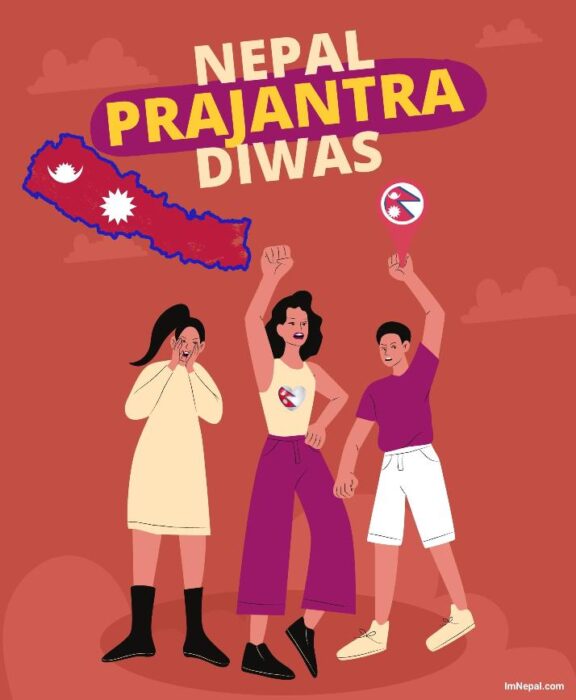“Celebrating the Spirit of Freedom: Reflecting on Nepal’s Democracy Day” provides an in-depth look at a national holiday that is both a joyous commemoration of freedom and a sad reminder of Nepal’s path to democracy.
In 1951, the authoritarian Rana regime was deposed, marking a watershed point in Nepali history commemorated yearly on Falgun 7th in the Nepali calendar as Democracy Day. Freedom, justice, and democratic rule began to transform Nepalese national consciousness and identity on this day, marking the beginning of a new era.
This momentous day is a tribute to the strength and bravery of the many people who dared to hope for a democratic Nepal. It’s a day to reflect on the hardships and sacrifices that came before us in our fight for freedom, a battle for the empowerment of the powerless, and the granting of a voice to the voiceless.

Observing Democracy Day in Nepal is about more than simply remembering the past; it’s also about contemplating the very nature of democracy in the country. Liberty, equality, and fraternity are the nation’s guiding principles, and this causes everyone to reflect on them.
As we begin this introspective journey, let us not forget that Democracy Day is more than a mere calendar occasion. It represents national pride, a reminder of how Nepal’s democracy is constantly evolving, and an impassioned plea for all Nepalis to do their part to fortify their democracy.
Advertisement
Nepalis of all ages are motivated to dream of and strive for a more just, equal, and wealthy nation by the same spirit of freedom that ignited the first democratic uprising.
Background in History
The long-running fight against the Rana regime, an era of authoritarian government and the repression of the people’s voice, is where Democracy Day in Nepal originated. The 104-year Rana rule was characterized by a concentration of power at the very top and a reduction of the Shah rulers to a ceremonial position. Spearheaded by devoted leaders and ordinary citizens, several upheavals and uprisings made the long and winding road to democracy.
Advertisement
Many influential people were involved in the democratic movement, including B.P. Koirala and King Tribhuvan. Independence from the Rana dynasty and the foundation of a democratic government in Nepal were both marked by the successful revolution of 1951, the watershed event that ultimately led to the creation of Democracy Day.
The promise of greater political and civic liberties and the opportunity for the average Nepali to have a say in the nation’s leadership were all part of the new era that began with the country’s democratic transition from dictatorship.
Advertisement
The Celebration of Democracy Day
On Democracy Day, Nepalis honor their nation’s democratic history with great pride. Numerous solemn and joyous ceremonies and events occur nationwide on this day. The government arranges formal events, such as speeches by dignitaries, highlighting the significance of upholding democratic principles and retracing the nation’s path toward democracy. To create a sense of civic duty and pride in their democratic history, educational institutions frequently organize events that teach the youth about the day’s significance.
The commemoration of the martyrs and freedom fighters whose lives were laid down in the fight for democracy is a distinctive feature of the festivities. In remembrance of them, we do things like laying wreaths at memorials and talking about what they accomplished for our country. As a constant reminder of the price of freedom and the continuing obligation to protect and cultivate the democratic process, these memorial ceremonies are essential in reiterating the democratic principles among the Nepalese people.
Advertisement
Democracy Day is more than a historical commemoration; it is a live testimony to the everlasting spirit of freedom and democracy in Nepal as one reflects on the significance of these ceremonies. Every Nepali has the chance to show their support for democracy and take part in creating a more equitable, inclusive, and wealthy nation. These festivities reignite the democratic flame, encouraging present and future generations to help Nepal’s democratic government thrive.
Reflections on the Current State of Democracy in Nepal
Despite specific difficulties, Nepal has made significant gains towards political stability and has seen substantial constitutional amendments since democratization in 1951. The new constitution was adopted in 2015, marking an important milestone in Nepal’s history.
Advertisement
It established the country as a federal democratic republic and sought to resolve long-standing concerns around representation, decentralization, inclusiveness, and inclusion. Nepal is working to create a democratic society that values and respects its various ethnic, linguistic, and cultural environments, and this evolution of its constitution reflects that dedication.
Nevertheless, many obstacles have been along the way, such as political instability characterized by frequent government changes, difficulties in implementing federalism, and governance issues that impact public trust and service delivery. These obstacles highlight how difficult it is to establish a strong democracy in a nation with deeply entrenched social and political hierarchies.
In Nepal, the future of democracy is shaped by the younger generation, civic society, and the rapidly growing realm of online activity. Educated and tech-savvy young Nepalis are leading the charge for more open government and more significant opportunities for citizens to have a say in policymaking.
If we want to see social and legal changes that protect the rights of underrepresented groups, we need more civil society organizations to take the lead. With the rise of digital platforms, more people can participate in democratic processes through political conversation and activity. Nevertheless, with these advancements come new difficulties, such as the necessity of digital literacy and the dangers of disinformation.
The state of democracy in Nepal has recently been under scrutiny due to political events and controversies, such as disagreements over constitutional changes and problems with the government. A critical evaluation of Nepal’s democratic institutions and the ability of its political leadership to steer the nation through times of change and strife is warranted in light of these occurrences.
The Role of International Perspective and Support
The changing international view of Nepal’s democracy throughout the years indicates shifting geopolitical priorities and a worldwide effort to advance democracies. From its strategic location between China and India to its unique challenges and triumphs in constructing a federal democratic system, Nepal’s democratic journey has garnered increasing interest.
Assistance in areas such as electoral support, governance changes, and capacity building for democratic institutions has been provided by numerous countries and international organizations, playing a vital part in Nepal’s democratic journey. Some have voiced worries that external pressures have taken precedence over Nepal’s internal interests and the independence of its decision-making processes, notwithstanding this assistance.
Advertisement
This global perspective emphasizes how Nepal’s democracy is linked to more significant international trends and problems, underscoring the significance of finding a balance between receiving outside assistance and cultivating a democracy that reflects and responds to the hopes and dreams of the Nepali people.
Looking Forward: The Future of Democracy in Nepal
Aspirations of the Nepalese people for their democratic system derive from a commitment to civil rights protection, inclusive government, and competent administration.
All across the country, people are longing for a democracy that values diversity and inclusion, making sure that people from all walks of life, regardless of their background, have a fair shot at success. A type of government that is open, responsible, and attentive to public concerns while still protecting individual rights and the rule of law is highly sought after.
Several changes and programs might be crucial to bolstering democracy in Nepal. To resolve regional inequities, decentralize authority, improve the judiciary’s independence and efficiency, and strengthen the electoral system to guarantee fair and transparent elections.
To encourage educated public discourse and ensure that individuals in power are held responsible, it is essential to cultivate a thriving civil society and guarantee a free press. Cybersecurity measures and digital literacy are also crucial to keeping the democratic process safe in the digital world.
Maintaining a healthy democracy requires constant attention and engagement from all parts of society. Democracy can only be strengthened and more resistant to threats if the government and organizations representing civil society, communities, and individuals work together.
In summary
In honor of Nepal’s long fight for independence and democratic rule, we celebrate Democracy Day. As a community, we can take stock of our progress and prepare for what’s to come, strengthening our resolve to uphold democratic principles. The democratic spirit in Nepal, marked by hopes for a fairer, more inclusive society, is evidence of the people’s tenacity and resolve.
Upholding and advancing democratic ideals must be the joint responsibility of all Nepalese citizens as the country continues to navigate its course. The future of democracy in Nepal may be safeguarded through unity and ongoing adherence to these ideals, providing hope for generations to come. In this way, Democracy Day is both a memorial to the past and a promise of a better future for all Nepalis, characterized by democracy in which everyone can thrive individually and collectively.
Advertisement





